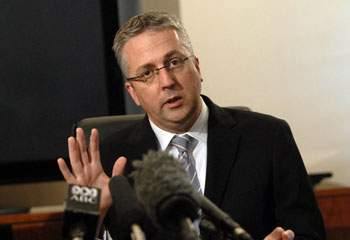Australians support the ABC because of its “trust and relevance,” according to Managing Director Mark Scott, who spoke at the National Press Club this week. “It is no accident that the use of ABC services, particularly local radio services, leaps during natural disasters and emergencies. Around the country, ABC staff live and work in the communities they serve. We are there for the long haul and Australians know that they can depend upon us. They trust us to tell them accurately and fairly what is happening,” Scott told the Press Club.
A recent independent report from Essential Media found that, in the 12 months to March this year, the Australian public’s trust of what they heard on the ABC rose, while trust measurements for all other media fell.
71% of respondents said they trust the news and current affairs on ABC television “some or a lot,” and 67% said the same about ABC radio. By comparison, news on commercial TV was trusted by 48% and commercial radio by 46%.
“This trend observed by Essential Media confirms the levels of trust in the ABC that Newspoll research has consistently found over many years,” Scott told the Press Club audience.
Commenting on ratings, Scott said it is one measure of engagement, but not the only one. “We aren’t out to win the ratings. I can tell you, Radio National and Classic FM, Compass, First Tuesday Book Club and Lateline are never going to win the ratings. But they all engage audiences and help us fulfil our Charter, provide distinctive content and fit well in the ABC’s line-up.”
Alluding to recent criticism from competitive media such as News Limited, Mark Scott said the ABC should be courageous rather than risk averse in its programming decisions.
“A trap for a highly-scrutinised organisation like the ABC, which has a capacity to be risk-averse in decision-making and with some organisational leanings towards the status quo, is to avoid change. There is often less immediate trouble that way. But in a time like this, when technology is changing the media business for organisations and the consumption opportunities for audiences, a failure to change could represent real risk to the ABC.”
The demands of audiences increase said Scott. “They want the latest news now. They want last night’s program today. They want to hear the Jon Faine interview – call in on talkback, comment in a chatroom. They want to ask the question from their living room of the Prime Minister on Q&A – and then tweet a comment on whether they liked the answer.”
In his speech Scott justified the expenditure on ABC News 24 but acknowledged internal critics who have said it has taken resources away from other areas such as digital radio, regional satellite radio services and locally produced tv arts programming. “I appreciate if we hadn’t invested it here there would have been more money to spend elsewhere. And as we look to further improve the service, then ABC News 24 will need to be a priority out of many claims for investment.”
Paying tribute to the four high profile ABC staffers who died recently, Scott closed off his speech saying:
“Lockyer, Bean, Ticehurst and Carroll: together they were with us for more than a hundred years. The ABC is full of people just like them. Committed to public broadcasting. Committed to telling the Australian story. Committed to playing an important role in the lives of innumerable Australians every day.
“One of the remarkable things about our four colleagues who died – is that each of them, despite all they gave, despite all their skills, viewed it as an absolute privilege to work at the ABC. They loved the place: the people, the work, the opportunity to be part of something so much bigger than any of us and so important to the country. In 60 locations around Australia, in foreign bureaux from Washington to Kabul, from Moscow to Moresby, there are thousands more like these four, who believe in this organisation and the work that it has done and will do.”

